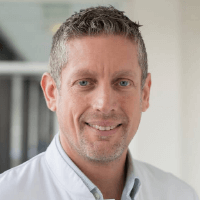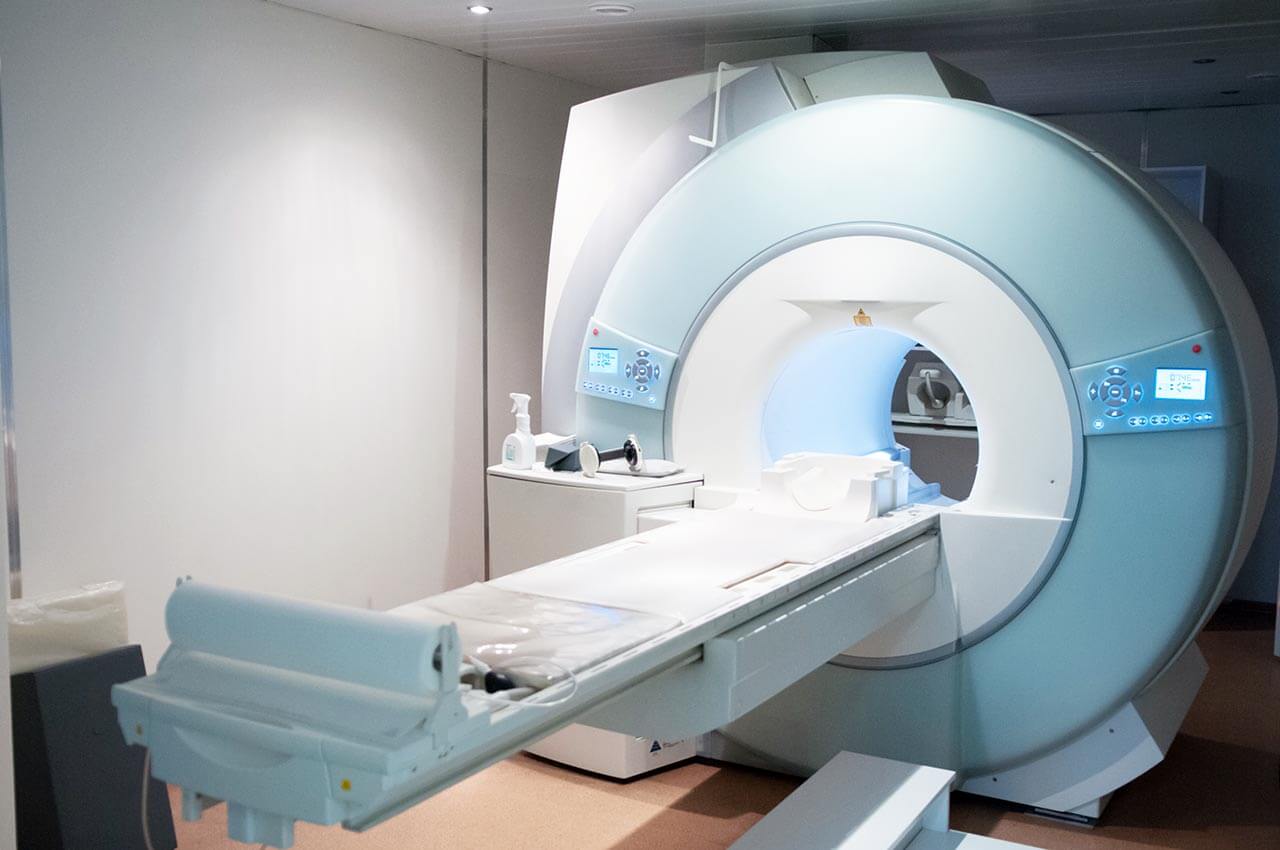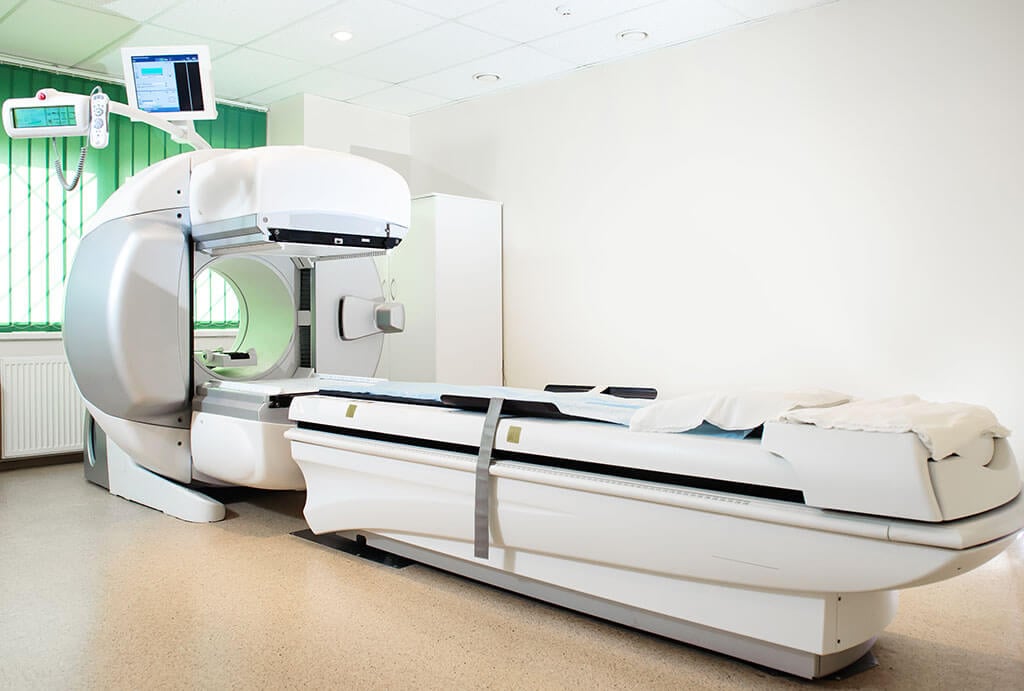
The program includes:
- Initial presentation in the clinic
- clinical history taking
- review of medical records
- physical examination
- laboratory tests:
- complete blood count
- biochemical analysis of blood (general and ionized calcium)
- general urine analysis
- hormone test (TSH, parathyroid hormone, calcitonin)
- inflammation markers (CRP, ESR)
- blood coagulation analysis (aPTT, PT, INR)
- thyroid ultrasound
- thyroid CT/ MRI (if clinically indicated, additional cost is 650/1200€)
- thyroid and parathyroid scintigraphy (if clinically indicated, additional cost is 1500€)
- nursing services
- consultation of related specialists
- treatment by chief physician and all leading experts
- explanation of individual treatment plan
Required documents
- Medical records
- Results of hormone blood tests (if available)
Service
You may also book:
 BookingHealth Price from:
BookingHealth Price from:
About the department
The Department of Endocrine Surgery at the DKD HELIOS Clinic Wiesbaden provides the full range of surgical interventions in its field of competence. The department's surgeons specialize in thyroid and parathyroid surgery. The primary focus of the department's doctors is the treatment of functional disorders, as well as benign and malignant tumors of both thyroid gland and parathyroid glands. The specialists perform more than 500 surgical procedures every year, thanks to which they have rich clinical experience and achieve effective treatment outcomes. The department has the status of a Competence Center for Thyroid and Parathyroid Surgery (certificate of the German Society for General and Abdominal Surgery). The operating rooms of the medical facility are equipped with cutting-edge technology, which guarantees patients the highest safety of surgical treatment. Many interventions are performed using sparing minimally invasive techniques, thanks to which patients recover and return to their usual life in the shortest possible time. The department is headed by Dr. med. Thomas Burgstaller.
Due to the fact that the department employs highly qualified surgeons with many years of clinical experience and has state-of-the-art surgical equipment, patients can count on highly effective treatment according to modern surgical standards. The department's operating rooms are equipped with ultrasound devices of the latest generation, surgical binocular loupes, neuromonitoring systems (including for continuous neuromonitoring), devices for intraoperative measurement of parathyroid hormone levels, etc. The equipment guarantees the highest accuracy and safety of surgical interventions on both thyroid and parathyroid glands.
The department's endocrine surgeons often deal with the treatment of patients with benign thyroid disease. One of the most common pathologies is nodular goiter - neoplasms in the thyroid tissue. To treat patients with the early stages of the disease, doctors use monitoring in dynamics and conservative drug treatment. If the pathology progresses, the only effective method for normalizing the patient's condition is often surgery. Prior to the surgical procedure, endocrinologists, together with the department's surgeons, study the results of the patient's diagnostic examinations and decide on the advisability of the surgical procedure and its type. When performing surgery, it is important for the doctors not only to remove the nodular neoplasms, but also not to damage the vocal cords and the recurrent laryngeal nerve that innervates them, which can lead to irreversible changes in the voice. To do this, the surgeons always use neuromonitoring, which allows excluding damage to the recurrent laryngeal nerve and other anatomical structures.
The department's surgeons are especially interested in the treatment of thyroid malignancies. When performing thyroid tumor resection, the doctors use neuromonitoring systems to ensure patient safety. The main feature of operations in the patients with cancer is the need for total removal of the thyroid gland and affected lymph nodes. An additional treatment for thyroid cancer is radioiodine therapy, which is provided in collaboration with the specialists from the Department of Nuclear Medicine. As a rule, the technique is used as adjuvant therapy for the complete destruction of the "residual" thyroid tissue, which can be detected even after a high-quality surgical procedure. In addition, radioiodine therapy helps to destroy regional and distant metastatic tumor foci.
The department's range of services is complemented by parathyroid surgery. Parathyroid diseases are less common than thyroid pathologies in the department's clinical practice. Most of the operations on the parathyroid glands are performed for hormonally active or inactive adenomas. During the intervention, the doctors use intraoperative measurement of parathyroid hormone levels for immediate control of the outcomes of the operation. In collaboration with the Department of Nephrology, endocrine surgeons perform surgery to treat secondary lesions of the parathyroid glands in dialysis patients. In such cases, they usually perform resection of the enlarged parathyroid glands.
The department specializes in the surgical treatment of the following diseases:
- Benign thyroid diseases
- Nodular goiter
- Thyroid adenoma (benign tumor)
- Autoimmune thyroid diseases
- Hashimoto's thyroiditis
- Basedow's disease
- Malignant thyroid diseases
- Papillary thyroid cancer
- Follicular thyroid cancer
- Medullary thyroid cancer
- Undifferentiated thyroid cancer
- Metastases from other tumors (for example, renal cell cancer, breast cancer)
- Parathyroid diseases
- Primary and secondary hyperparathyroidism
- Other endocrine disorders
Curriculum vitae
On February 17, 2020, Dr. med. Thomas Burgstaller was appointed as Chief Physician of the Department of Endocrine Surgery at the DKD HELIOS Clinic Wiesbaden. Since 2014, the specialist has worked in the Department of Endocrine Surgery at the Schön Hospital Hamburg – the second largest Endocrinology Center in Germany, which performs more than 2,000 operations every year.
Dr. Burgstaller received his medical education at the University of Vienna. During his postgraduate training, he already conducted practical activities – he performed thyroid and parathyroid surgery. Prior to moving to Hamburg in 2016, the specialist held the position of Chief Physician of the Center for Endocrine Surgery at the Hospital of the Sisters of Mercy Linz. He has also worked as an Auditor for the Endocrine Surgical Quality Registry (Eurocrine). Dr. Thomas Burgstaller's research is focused on the complications of parathyroid removal surgery.
Photo of the doctor: (c) DKD Helios Klinik Wiesbaden
About hospital
The DKD HELIOS Clinic Wiesbaden has long made a name for itself in the international medical arena by introducing an optimal model of medical care, combining the use of the most advanced medical technologies, the experience of highly qualified doctors and impeccable quality of patient care. The medical facility first opened its doors to patients in 1970. The world famous Mayo Clinic Rochester in America served as a model for the design of the medical complex. Since the foundation of the clinic, the main direction of its activities has been comprehensive diagnostics of complex diseases integrated into an interdisciplinary treatment concept. Today, an integral part of clinical practice is also preventive diagnostics aimed at the early detection of pathological changes in the human body. In recent years, the clinic has been actively developing the direction of surgery, in which it has significantly succeeded. The clinic enjoys a reputation as one of the best medical facilities in Europe in the field of endocrine and colorectal surgery, as well as in hernia repair surgery.
The clinic has 24 specialized departments. Each of them offers a team of experienced doctors, whose main value is the patient's health. The work of all doctors of the medical facility is based on a single credo – "Treat not a disease, but a patient". According to this belief, the course of treatment should be as individual as possible, taking into account the patient's physical characteristics, lifestyle, diet, emotional state, etc.
The clinic's bed capacity consists of 138 inpatient beds and 60 beds in a day hospital. Many diagnostic and therapeutic procedures are performed on an outpatient basis. The diagnostic and treatment rooms, like the operating rooms of the clinic, are equipped with state-of-the-art technology to ensure the observance of strict hygiene and safety standards. The advanced medical equipment allows detecting the slightest changes in the functioning of organs and their structure with impeccable accuracy, thanks to which doctors can diagnose complex pathologies at the very early stages. This greatly increases the chances of a successful cure.
The location of the clinic in Wiesbaden, known as one of the oldest thermal spas in Europe, is another pleasant advantage for the patients. Arriving at the clinic for a preventive diagnostic examination, one can improve his health in the healing thermal springs, as well as enjoy the sightseeing of historical monuments. The medical center is located in the immediate vicinity of the English style Spa Park founded in the distant 1852, so in the free time from medical procedures one can take a pleasant walk in the beautiful park.
Photo: (с) depositphotos
Accommodation in hospital
Patients rooms
The patients of the DKD HELIOS Clinic Wiesbaden live in comfortable single and double rooms. Each patient room has an ensuite bathroom with shower and toilet. The standard patient room furnishings include an automatically adjustable bed, a bedside table, a table and chairs, a TV and a telephone.
The clinic also offers enhanced comfort rooms with spacious bathrooms, which additionally include a large mirror, hairdryer, changeable towels and toiletries. These patient rooms also have a safe for storing valuables, a free minibar with soft drinks, a flat-screen TV with satellite channels and free Wi-Fi.
Meals and Menus
The patients of the clinic are offered tasty and balanced three meals a day: breakfast, lunch and dinner. If for some reason you do not eat all the foods, you will be offered an individual menu. Please inform the medical staff about your dietary preferences prior to treatment.
The clinic also has a cozy cafe where one can taste delicious snacks, salads, main courses and desserts. One can also enjoy aromatic coffee, delicious tea and soft drinks in the cafe.
Further details
Standard rooms include:
Religion
The religious services are available upon request.
Accompanying person
During the inpatient program, the accompanying person can live with the patient in a patient room or a hotel of his choice. Our managers will help you choose the most suitable option.
Hotel
During the outpatient program, the patient can stay at the hotel of his choice. Our managers will help you choose the most suitable option.





